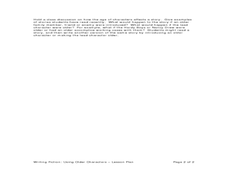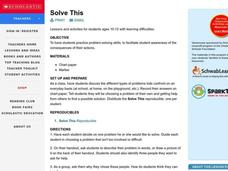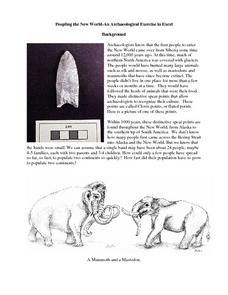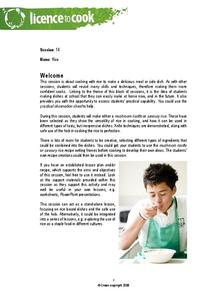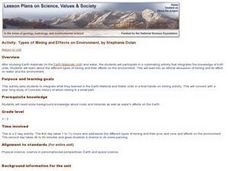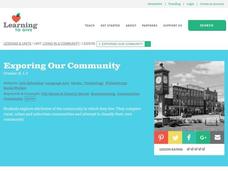Curated OER
Increased Productivity
Students work in small groups using several different methods to sharpen pencils. The methods used show how production can be increased based on the methods used and the time consumed. Each group of students writes a report detailing...
Curated OER
The Holocaust
High schoolers comprehension widens on the subject of the Holocaust by focusing on two different, yet related, experiences of Jews in Europe during the Holocaust. Those being death camps and life in major ghettos. They trace both...
Curated OER
Writing Fiction: Using Older Characters
Out with the old and in with the new? Not so in this lesson plan, which explores the idea of writing older characters in fiction. Students learn the value of varying their characters, exploring different perspectives, and avoiding...
Curated OER
I Am Special and You Are Special Too #3
Students explore the meaning of unique and special. They study about why a birthday is significant. They investigate how families celebrate birthdays in different ways and they reflect on why growing up is a good thing.
Curated OER
Food for thought
Cake has to be good for something, right? Different foods are used by our bodies in different ways. Learners will first read about what fats, proteins, fruits, and vegetables do for the human body. They will then put each of food shown...
Curated OER
Waste Management
Four different activities focus on the amount of trash generated and how humans can better manage waste. Learners analyze two days' worth of household garbage, test materials for biodegradability, and rate recyclability of various...
Curated OER
Soil's Secret
Students examine two types of soils in their area. They identify its texture and permeability to determine its origin. They share their results with the class.
Curated OER
Food and Culture: Exploring the Flavors of Your Community
Students brainstorm the types of food they eat at home, discussing and comparing with the class. Students brainstorm and make a chart of questions that came out of the activity and their discussions. Students interview someone who...
Curated OER
Classifying Functions
Eleventh graders sort different types of functions including rational, periodic, exponential, polynomial, quadratic, logarithmic and linear using "function cards." The functions are displayed in multiple representations including...
Curated OER
Water Use and Conservation
Students discuss the different types of water found on Earth. They discover why not all water is used for drinking and calculate how much water they use. They create their own water conservation plan.
Curated OER
Personalized Poetry Portfolio
Eighth graders create their own poetry portfolio containing poems that relate to Students' lives and families. The portfolio consist of the following types of poems: acrostic, diamante`, haiku, cinquain, and free verse.
Curated OER
Identify the Element of Line
Students explore the element of "line." In this beginning art lesson, students listen to the book Harold and the Purple Crayon, then describe the types of lines Harold drew. Students identify straight lines, jagged lines, curvy...
Curated OER
My Crazy Contraption
Fourth graders design a contraption, which contains five different examples of simple machines and works without intervention. They sketch designs and label its parts. They present their creations to the class and relate them to Rube...
Curated OER
Solve This
Students with learning disabilities practice their problem-solving skills. They discover the consequences of their actions and they chart their decisions. They use the internet to see how different situations play out based on different...
Curated OER
Global Art: A Sense of Caring
Learners participate in a global art project in which students from around the world share their art. They explore different cultures and languages as they view different types of art.
Curated OER
Peopling the New World -- An Archaeological Exercise in Excel
Students examine different types of spears that have been discovered from various civilizations. In groups, they calculate the answers to various word problems and enter their information on a spreadsheet. They use the data in other...
Curated OER
Families and Neighborhoods
Students create a poster representative of their community. In this lesson plan on the world around them, students learn about their neighborhood. After they have gathered some knowledge about the objects and people in their community,...
Food a Fact of Life
Rice
Mushroom risotto or savory rice? Class cooks craft clever and creative dishes that demonstrate the versatility of this popular grain.
Lisa Staab Shadburn
Play Therapy Activities to Enhance Self‐Esteem
Discover activities to help learners increase self-awareness, build peer and family relations, and develop positive self-esteem. Here you'll find six suggestions for instilling a sense of confidence and self awareness in youngsters. Each...
Bolton Healthy Schools
Deal with Poetry
The stated goal of this unit is to use poetry to "improve the emotional health of young people." Budding poets read and then supply their own lines for poems that deal with alienation, loneliness, and rejection.
Do2Learn
Days and Weather Picture Cards
Weather happens everyday. Print these color weather cards onto card stock, laminate them, and use them in a daily weather forecasting routine that practices calendar skills and daily weather identification.
Curated OER
Social Studies: Your Family Does What?
Sixth graders compare and contrast their own personal culture with that of Japan. They fill out questionnaires, compile the results, and match them with Japanese answers to the same forms. Students create a Venn diagram of the...
Curated OER
Periodicity (The Periodic Table)
Students investigate the properties of elements and periodicity. In this periodicity lesson plan, students observe a bag of 'elements' which are different fruits and classify them in groups and periods, show the periodic relationships...
Curated OER
Living in a Community
Students understand the differences in communities by reading "City Mouse, Country Mouse" by Isabelle Chantellard. In this types of communities instructional activity, students find that although communities are different, one is not...


